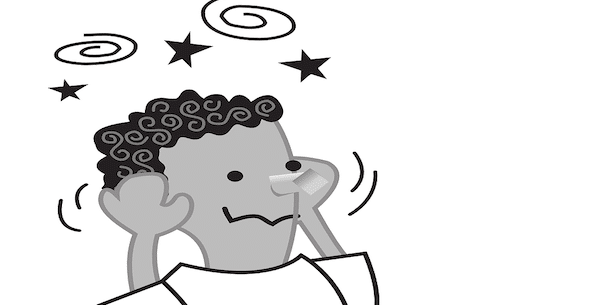A subset of individuals with acid reflux syndromes will experience a phenomenon unofficially referred to as “acidic vertigo.”
Some may also call this “reflux vertigo” or “acidic labyrinthitis.”
Others will just say that they experience “dizziness” as a byproduct of acid reflux.
In most of these cases, the underlying mechanisms are likely similar.
Mechanisms of Acid Reflux Dizziness & Vertigo
The mechanisms by which reflux could cause vertigo are pretty straightforward.

1. Reflux occurs
Various compounds such as: pepsin, acids, enzymes, bile, gas, bacteria, food particles, etc. (i.e. refluxate) – “reflux” or move in a direction opposite from normal within the GI tract.
Specifically, the “refluxate” content enters the upper GI tract such that they reach otolaryngologic areas (i.e. ear, nose, throat).
2. Otolaryngologic inflammation
When refluxate reaches otolaryngologic structures, it probably triggers some degree of inflammation.
If the inflammation is significant and/or in a specific location (e.g. the inner ear) – this can cause people to experience “dizziness” or “vertigo.”
3. Dizziness & vertigo directly from refluxate (?)
Another possibility is that there’s not really any significant inflammation occurring within otolaryngologic structures to cause vertigo.
Instead what might be happening is that “refluxate” contents might accumulate to increase pressure in certain areas and/or alter functionality of certain structures – which could cause vertigo.
How to know if you have vertigo from acid reflux
Acidic vertigo should generally be a diagnosis of exclusion – because you don’t want to miss a potentially more serious or fatal medical condition that may be the source of vertigo (e.g. bacterial infection, autoimmune condition, etc.).

1. Rule out common causes of vertigo
A medical doctor (MD) should conduct an extensive evaluation to rule out conditions (other than reflux) that may be causing vertigo.
Why? Although reflux can cause dizziness and vertigo – it isn’t necessarily a common symptom.
- BPPV (Benign Paroxysmal Positional Vertigo)
- Meniere’s disease
- Vestibular neuritis
- Labyrinthitis (e.g. infectious, allergy-related, drug-induced)
2. Meet diagnostic criteria for acid reflux
If the dizziness or vertigo you’re experiencing is caused by refluxate (e.g. acids, pepsin, gas, bile acid, pancreatic enzymes, bacteria) – you’ll probably meet diagnostic criteria for a “reflux” condition.
- Nasopharyngeal reflux (NPR)
- Laryngopharyngeal reflux (LPR)
- Gastroesophageal reflux (GERD)
Although severe GERD may cause acid to reflux up into the upper GI tract and reach otologic structures (e.g. Eustachian tubes) to cause inflammation and subsequent dizziness/vertigo – NPR or LPR are more common causes.
(Keep in mind that a person may have both LPR & GERD.)
3. Meet diagnostic criteria for vertigo
What you may think is vertigo or labyrinthitis might not actually be vertigo or labyrinthitis.
This is why you should be properly diagnosed by a medical doctor (MD).
A specialist evaluation may be necessary along with neuroimaging (e.g. CT scan, MRI, etc.).
4. Determine whether acid reflux treatment improves vertigo
If successful management/treatment of acid reflux conditions fixes your vertigo – then you can be pretty confident in the fact that you were experiencing acidic vertigo.
Understand that it may take some time (e.g. days or weeks) before inflammation fully subsides within otolaryngologic structures after successful reflux management.
If any “refluxate” is present within these structures – it may take time to clear out.
5. Intentionally reflux aggravation (?)
This is probably NOT smart if you have severe vertigo or dizziness.
However, if you want additional clarity (that vertigo is likely from reflux) – you may want to try doing something that makes your reflux worse – to determine if it also makes your vertigo worse (or causes vertigo at a time when you’re not experiencing vertigo).
For example: If drinking a carbonated beverage worsens your reflux – you might want to drink one beverage and determine whether vertigo occurs.
Another example might involve eating something that makes your reflux worse to determine whether this induces an acidic vertigo.
If reflux-inducing/aggravating activities cause your vertigo to significantly worsen – then you can be more confident the etiology of your vertigo is refluxate.
6. Self-reflection (correlation analysis)
Another way to determine whether vertigo is likely caused by acid reflux is to take time to self-reflect on whether there’s a correlation between episodes of vertigo (or vertigo severity) and the severity of your acid reflux condition.
If your reflux flares up and vertigo seems to follow suit – this increases the likelihood that the vertigo is a consequence of the reflux.
Similarly, if your reflux significantly improves (e.g. due to PPI therapy, weight loss, etc.) and vertigo miraculously improves or ceases – you can be confident that the reflux is causing your vertigo.
On the other hand, if your reflux is still severe and the vertigo goes away – the vertigo may be due to some other underlying factor (e.g. BPPV).
If your reflux is well-managed for several weeks (e.g. no substantial reflux) yet the vertigo remains or intensifies – it may not be related.
7. Burning sensation or pressure (?)
Those who experience vertigo as a result of acid reflux often report a noticeable “burning sensation,” increased pressure, or other symptoms in the ear, nose, and/or throat areas – resulting from the backflow of acids and other refluxate.
Essentially the acids backflow into the upper throat, sinuses, and possibly between the ears wherein they aggravate and inflame the Eustachian tubes.
As a result, a person may report vertigo – in addition to symptoms like: globus sensation (throat); inflamed sinuses even without mucus (nose); and pressure, popping sounds, or burning sensations between the ears.
Acid Reflux & Dizziness (Research)
Included below are studies that discovered connections between acid reflux (or similar conditions) and dizziness & vertigo.

Viliusyte et al. (2015): “Peripheral vertigo was present in 93/120 patients (77.6%) with GERD compared to 33/126 (26%) of patients without GERD.” This was a statistically significant relationship. (R)
Ahuja et al. (1999): “An estimated 20-60% of patients with GERD have head and neck symptoms without any appreciable heartburn.” (R) Though this report does NOT specifically discuss vertigo or dizziness as manifestations – but implies that these could occur (head & neck).
Choi & Kim (2014)
- A 57-year-old man presented with frequent belching and dizziness.
- He was diagnosed with “Jackhammer esophagus” (a rare GI motility disorder) and put on a combination of nifedipine (60 mg/d) and flunarizine (5 mg/d).
- Treatment led to a decrease in belching and dizziness by ~80% vs. baseline. (R)
This man was chronically burping (gaseous reflux) which may have reached otologic structures, caused inflammation, and ultimately the dizziness symptom.
Though not many researchers have investigated whether acid reflux causes vertigo/dizziness (mostly due to the fact that there’s not much to gain from knowing whether the association exists) – there are data supporting the relationship.
Related: Acid Reflux & Ear Pain.
It makes logical sense that reflux could cause vertigo & dizziness…
If we think about this logically – we know the following:
- Refluxate can reach the upper throat and nose (such as in LPR/NPR and severe GERD).
- Refluxate can cause inflammation.
- Inflammation within the inner ears/sinuses may cause dizziness or vertigo.
The evidence seems to support this logic – as peripheral vertigo occurs at significantly higher rates in GERD patients than those without GERD.
My guess is that patients with NPR and LPR are even more prone to vertigo than GERD patients due to the fact that the reflux occurs higher up the GI tract.
How many people experience dizziness & vertigo from acid reflux?
The exact number is unknown – mostly due to lack of research in this domain.

It is known that nearly 40% of U.S. adults experience vertigo at least once in their lifetime. (R)
The research by Viliustye et al. indicates that over 3/4 patients with GERD (77.6%) experience peripheral vertigo (i.e. vertigo resulting from structures in the inner ear like the vestibular labyrinth/semicircular canals).
That said, it is unclear as to whether the peripheral vertigo is actually caused by the GERD (as many GERD patients have other health conditions that could cause/contribute to the vertigo).
In non-GERD patients, Viliustye et al. found that vertigo was present in about 1/4 patients (~26%).
If we subtract the difference – one might suspect that reflux causes dizziness or vertigo in around 50% of patients.
Do medical doctors think acid reflux can cause vertigo?
On the website “Practo” a 35-year-old male asks whether there’s a possibility that positional vertigo can be caused by acidity from indigestion and gastric contents.

Question: Is there a possibility that positional vertigo can be caused due to acidity from gastric problems? (R)
Dr. Pinaki Mazumder (ENT)
Thinks that the vertigo (e.g. BPPV) was the cause of the acidity (rather than vice-versa).
He claims that during an episode of vertigo, the vagus nerve is stimulated which gives rise to symptoms like “gastric acid secretion.”
His take: “Acidity is not the cause but the effect.”
Recommendation: Treating vertigo with the Epley maneuver will (according to him) “cure the condition.”
My thoughts: I assume that if you’re bending over feeling nauseous or lying down in odd positions – then stomach acid can seep up into the upper GI tract. I’m not convinced that merely having “vertigo” causes reflux. (I’ve had episodes of BPPV in the past with ZERO reflux.)
Dr. Bipin Ninan Abraham (GP)
“It is likely the hyperacidity you feel is a different problem in whole.”
(Examples: BPPV; Meniere’s disease; Vestibular neuritis; head/neck injury; brain problems such as stroke/tumor; or using certain medications that cause ear damage/migraines.)
Recommendation: Betahistine and antacid plus diet & lifestyle changes.
My thoughts: Logical advice here. Obviously this person could have a non-gastrointestinal medical condition causing vertigo and should be evaluated by a medical doctor (in-person rather than online.) If diet and lifestyle changes improve the indigestion/acid – and vertigo subsides, then the vertigo was probably from the acidity.
Dr. Gladson Guddappa Uchil (Allergist/Immunologist)
Vertigo can be caused by both otolith displacement-related vestibular nerve changes (i.e. BPPV) – but also due to “Acute Acidic Labyrinthitis” due to Eustachian Tube Dysfunction as a reaction to Reflux Esophagopharyngitis.
He thinks that the inquirer is suffering from the latter condition (Acute Acidic Labyrinthitis).
Recommendation: Anti-reflux agents containing alginates (alginic acid) plus good “nasal decongestant drops.”
My thoughts: Probably the most accurate diagnosis – with solid advice.
It should be noted that this particular individual did NOT claim to have been formally diagnosed with a gastrointestinal disorder or reflux condition (e.g. GERD, LPR, NPR).
Instead he asked whether acidity due to indigestion could’ve been the cause of his reflux.
That said, he may have an undiagnosed GI disorder that’s causing both indigestion and vertigo (as he obviously suspects a correlation and notices “acidity” in his stomach).
I personally would’ve asked him if he notices any acid-related symptoms in his throat, nose, and ears – and/or a correlation between acid flares and vertigo flares (and which precedes the other).
Moreover, I’d want to know whether the vertigo improves at times when the indigestion/acidity improves.
Acid Reflux Dizziness: Nuance…
Some basic things to know and understand before automatically assuming dizziness is a direct consequence of your reflux condition.

Dizziness can occur independently of “reflux”
For example, someone may be diagnosed with “acid reflux” and “vertigo” (e.g. from BPPV).
In this case, the vertigo is physiologically distinct from the reflux.
Moreover, a person may happen to experience “acid reflux” and “vertigo” (from BPPV) at the same time – without any causality.
Reflux can cause dizziness
Evidence seems to suggest that vertigo occurs at significantly higher rates in GERD patients than non-GERD patients.
This makes it reasonable to suspect that reflux may be the direct cause of dizziness/vertigo in some individuals.
Vertigo may cause reflux (?)
In some cases, it may be the vertigo that’s causing acid reflux.
Certain doctors think that vertigo alters vagal nerve function which increases gastric acid secretion – ultimately causing reflux.
It may also be that a person with vertigo is repositioning his/her body in ways that cause reflux – in attempt to attenuate the vertigo.
Dizziness may occur both independently AND as a consequence of reflux
A person might be diagnosed with “acid reflux” and “vertigo” (e.g. from BPPV).
The acid reflux and vertigo might usually occur via physiologically unrelated mechanisms.
On occasion, it’s possible that acid reflux causes “acidic labyrinthitis” which could increase the severity of a vertigo episode associated with BPPV.
Reflux may cause inflammation, pressure, and/or functional changes in otolaryngologic structures
Refluxate into otolaryngologic structures (such as occurs with NPR, LPR, and severe GERD) may cause inflammation and/or mechanical changes.
A manifestation that’s commonly reported is Eustachian tube dysfunction – associated with popping and crackling noises/sensations within the ears and dizziness/vertigo.
Reflux may cause infection (subsequent dizziness)
Evidence suggests that acid reflux can increase risk of upper respiratory tract infections (throat, sinuses, ears).
This can be due to refluxate altering mucus membrane functionality/composition – or medications used to manage reflux (e.g. PPIs) which increase infection risk.
An infection may cause inflammation/damage – resulting in vertigo.
Moreover, antibiotics to treat bacterial infections may cause vertigo via oto-vestibular actions.
LPR & NPR more likely to have (severe) dizziness/vertigo than standalone GERD
Patients diagnosed specifically with laryngopharyngeal reflux (LPR) or nasopharyngeal reflux (NPR) are more likely to experience vertigo than patients with standalone GERD.
Standalone GERD can still cause “vertigo” (this is supported by research), however, significant refluxate does not usually reach the sinuses and inner ears (such as in LPR & NPR).
Anti-reflux medications might cause dizziness
Before you assume that the “vertigo” you’re experiencing is from “acid reflux” – consider that it may instead be due to the medication(s) you’re using to treat acid reflux.
(Especially if there was a correlation between when you began the meds and vertigo onset.)
Many PPIs and H2 antagonists can cause dizziness as side effects.
Even liberal usage of antacids containing magnesium carbonate might affect blood pressure and cause mild dizziness.
Is the term “acidic vertigo” misleading?
Perhaps. Why? Because although gastric “acids” may be the cause of labyrinthitis – hence the specific name of “acidic labyrinthitis” – gastric acids are NOT usually the only contents that are refluxed up into otologic structures.

Other things could be causing otologic inflammation as well:
- Pepsin (a stomach enzyme)
- Bile salts
- Bacteria (abnormal upper GI bacteria)
- Pancreatic proteolytic enzymes
- Food particles
For this reason, it’s probably safer to call this phenomenon acid reflux-associated vertigo or something – due to the fact that the vertigo is a downstream consequence of reflux.
Common Signs of Acid Reflux Dizziness (Acidic Labyrinthitis)
Included below are common signs of acid reflux-related vertigo/dizziness.
Obviously vertigo or dizziness is the chief symptom – but other reactions may indicate that refluxate is likely the culprit (based on structures its reaching).
Vertigo
Sensation of whirling and loss of balance – may be exacerbated by moving head too quickly.
- Dizziness: Some may use the term “dizziness” to describe how they feel with vertigo.
- Balance issues: Feeling as though you’re “off-balance” or about to fall at any moment can be a sign of equilibrium dysfunction (i.e. disequilibrium) and vertigo.
Eustachian tube dysfunction
Refluxed acid/refluxate may reach the Eustachian tubes and cause inflammation and dysfunction.
Eustachian tube dysfunction can be diagnosed by an ENT – and is generally accompanied by symptoms such as:
- Ears feeling plugged or full
- Muffled sounds
- “Popping” or “clicking” sensations
- Inner ear “tickling” sensations
- Pain in one or both ears
- Pressure in ears
- Tinnitus (ringing in the ear)
Nasal inflammation (Sinusitis)
It may become more difficult to breathe out of your nose due to a sinusitis-type condition involving sinus inflammation from refluxed contents.
Most people will experience inflammation and increased difficulty breathing out of the nose due to less efficient airflow (as a result of the inflammation).
Signs of reflux-associated sinusitis include:
- Clogged or plugged nose (without mucus)
- Difficulty breathing air in through the nose (despite no mucus)
- Pressure in the sinus area
- Congestion (?): Possibly increased mucus due to inflammation interfering with mucociliary flow/clearance. If thick mucus – bacterial sinus infection should be ruled out (this could be a consequence of the initial inflammation).
Globus sensation
You might experience a “lump” in your throat due to pharyngeal inflammation resulting from refluxate.
Essentially the refluxate enters your upper throat and, over time, causes an inflammatory reaction presenting as “globus sensation” (subjective lump, food getting stuck, mild difficulty swallowing).
Sensation behind eyes
Generally, this sensation will be “mild” – and won’t cause your eyes to water or changes in vision.
However, you may feel something subtle behind your eyes (like a barely-noticeable allergy).
Read: Acid Reflux & Eyes.
Popping or clicking noises
These popping or clicking sounds are a sign of refluxate backflow into the throat, nose, and/or ears.
Common descriptors of noises include: intermittent popping; crackling; clicking; fizzing; ticking; bubbling; etc.
- Ears: You might hear inconsistent sounds between your ears.
- Nose: You might hear a crackling noise in your sinuses.
- Throat: You might notice a popping sound in your throat/mouth area.
Burning sensations
For some individuals, the refluxate causes a perceptible “burning sensation” between the ears and in the upper throat.
This burning is less likely to be perceived in the nose – but may occur there as well.
Note: If any of these symptoms are severe – you should NOT assume that what you’re experiencing is from reflux. Get emergency medical care from an ENT (otolaryngologist).
What to do if you’re experiencing dizziness from acid reflux?
Proper medical evaluation
Consult a medical doctor to rule out potentially serious undiagnosed conditions that may be causing vertigo.
(Don’t assume it’s from reflux.)
Manage the reflux
Do whatever it takes to get the reflux under control. Should be a protocol with some trial and error.
If nothing works – get surgery.
Potential things to try:
- Proton-pump inhibitors (PPIs)
- H2 antagonists
- Alginates (Alginic Acid)
- Antacids
- Low acid diet
- Eating earlier dinners
- Fat loss (Read: Weight Loss & GERD)
- Upper body elevation
- Stress reduction
Modify otolaryngologic mucosa (?)
In addition to treating/preventing reflux, it may be beneficial to modify the otolaryngologic mucosa.
Before trying any of these recommendations – verify safety with a medical doctor.
Alkaline water
The key is drinking frequently NOT the amount you drink.
The goal is to keep your upper throat coated with alkaline pH (to offset acidic contents like pepsinogens which may be causing burning).
I like Essentia Alkaline Water (affiliate link) 9.5 pH and reasonably priced compared to most).
Note: Low acid/alkaline refluxate may cause burning for some people – so realize this is NOT always effective. You can gargle this as well.
Saline nasal spray (sterile)
I like Arm & Hammer nasal spray (affiliate link) in compressed cans.
Has some sodium bicarbonate – but generally not enough to make a serious difference in how the area feels.
Helps flush out refluxate that may have reached the sinuses.
Alkaline water & baking soda (gargle)
Gargle a combination of 1 cup alkaline water and 1 tbsp baking soda (affilate link) in the back of your throat.
The goal here is to neutralize acidic contents in the nasopharyngeal region with alkalinity.
Alkaline & baking soda (nasal rinse)
Use an empty nasal spray vial (or buy one) and fill with purified alkaline water and baking soda solution.
Spray into sinuses while inhaling – and into back of throat while inhaling.
Independently treat vertigo (?)
In select cases, it may be smart to treat the vertigo as a separate entity from the reflux.
One ENT thinks that doing the “Epley maneuver” may fix acid-related vertigo because the vertigo may be causing stomach acid to increase (via vagal nerve alterations).
This makes sense if you have BPPV – but probably won’t do anything if the vertigo is a result of reflux.
Beware that medications to treat reflux can cause dizziness & vertigo…

Research supports the idea that PPIs, H2 receptor antagonists, GABAergics, and others can cause dizziness and vertigo as side effects.
A comprehensive European Review (2020) of oto-vestibular side effects from medications indicated that proton-pump inhibitors (PPIs) should be considered: “drugs inducing vertigo or dizziness.”
That said, vertigo or dizziness was considered “uncommon” (between 0.1% and 1% of users). (R)
Other studies go as far as to suggest that proton-pump inhibitors (PPIs) could cause or increase risk of hearing loss and tinnitus (possibly via direct or indirect ototoxicity – such as ototoxicity from micronutrient malabsorption and deficiencies.) (R)
There seems to be correlational research showing that PPI usage is associated with an increased risk of hearing loss and tinnitus. (R)
Assuming oto-vestibular toxicities are more likely to occur with proton-pump inhibitor (PPIs) usage (as a direct or indirect effect) – then it makes sense dizziness and vertigo could occur (as an effect of oto-vestibular toxicity).
If you’re taking a medication for the treatment of reflux – and: (1) dizziness or vertigo emerged only after starting medications; (2) dizziness and/or vertigo increased with dosage increases; and/or (3) the reflux is well-managed but dizziness and vertigo still occur – it’s likely that the medication is more culpable for dizziness or vertigo.
Even antacids may cause vertigo and dizziness in some individuals depending on chemical composition/ingredients.
Consult an ENT if dizziness and/or vertigo occurs during treatment and determine the best course of action.
Beware of other medical conditions & habits causing dizziness & vertigo…
Many people with acid reflux conditions are overweight/obese (this is a major risk factor).

Though not everyone with acid reflux has a co-morbid medical condition – many do.
- Type 2 diabetes: Blood sugar dysregulation may cause dizziness/vertigo. (Meds to treat this condition may as well.)
- High blood pressure: Blood pressure alterations could cause dizziness. Antihypertensive agents can cause lightheadedness, dizziness, and vertigo.
- High cholesterol/lipids: Dizziness is a common side effect of some statins – but not usually “vertigo.”
- Neuropsychiatric disorders: Mental disorders can cause dizziness/vertigo – and so can many medications used to manage these conditions.
- Sleep apnea: Sleep apnea may cause dizziness, vertigo, and reflux due to mouth breathing/suction-type effects.
- Tobacco & alcohol: Usage of tobacco and/or alcohol may cause reflux and vertigo/dizziness.
- Autonomic dysfunction: Can cause reflux conditions – and can cause dizziness/vertigo independently of the reflux. (R)
Many co-occurring medical conditions should be investigated as potential causes of dizziness and/or vertigo in those who experience dizziness/vertigo with reflux.
Beware of anxiety-related dizziness…
This is a completely distinct type of dizziness that can occur in people with reflux conditions wherein initial reflux occurs…
Then, an individual experiences reflux-related symptoms such as burning or chest pain and develops anxiety over these symptoms.
Essentially this triggers a somatic form of anxiety wherein an individual becomes fixated on bodily sensations – thinking that these sensations are signs of something more serious.
Anxiety-related dizziness tends to be associated with other somatic manifestations of anxiety such as heart palpitations (loud/fluttery heart beat), headaches, sweating, etc.
Many people with gastroesophageal reflux disease (GERD) have anxiety which can induce and/or exacerbate reflux symptoms.
In turn, the reflux symptoms can induce bodily sensations which exacerbate or reinforce the anxiety symptoms.
Note: Most people on Reddit seem to fit this profile.
Differentiating anxiety dizziness vs. reflux dizziness
Most individuals with acidic labyrinthitis will have extra-esophageal complications as a result of: (1) laryngopharyngeal reflux (LPR a.k.a. supra-esophageal reflux, nasopharyngeal reflux, etc.) or (2) severe gastroesophageal reflux (GERD) – or both.

Those without extra-esophageal complications of acid reflux will NOT have true acidic labyrinthitis or dizziness resulting from the effect of acid on inner ear structures.
Dizziness as a direct effect of reflux tends to be severe and causes disequilibrium, vertigo, and a variety of other issues.
People with dizziness resulting from extra-esophageal complications of reflux tend to have the following signs & symptoms:
- Disequilibrium & balance problems: The feeling as though you just got off a rollercoaster ride; are seasick; or are struggling with fine motor skills after drinking too much alcohol (feeling “tipsy”).
- Urge to sit or lie down: It’s difficult to stand upright when you feel extremely dizzy and cannot trust your balance.
- Grabbing onto things for balance: Feeling as though you need to grab something while standing up.
- Cognitive deficits & confusion: Mostly occur here because you feel so dizzy that it’s difficult to focus on anything – you can barely keep your balance.
- Extra-esophageal burning sensations: In the throat, between the ears, behind the eyes. This is a sign that the refluxate is reaching extra-esophageal areas and has potential to cause inner ear inflammation to trigger dizziness.
- Postnasal drip: Resulting from extra-esophageal reflux. This drip may be associated with sinusitis, otitis, and eustachian tube dysfunction. Essentially it can trigger eustachian tube catarrh.
Other possible scenarios to consider as well…
Reflux-induced rhinosinusitis, otitis, eustachian tube dysfunction: Reflux can cause sinus inflammation, ear inflammation, eustachian tube dysfunction, and infections in these areas. The combination of inflammation, dysfunction, and/or infection can also trigger feelings of dizziness (disequilibrium, vertigo, etc.).
Vagus nerve (?): Some individuals on various forums hypothesize that reflux is somehow affecting or damaging the “vagus nerve” and this is causing dizziness. Although this is an intriguing theory, I spoke with a Gastroenterologist MD who stated (exact quote):
“Chronic acid reflux does NOT damage vagal nerves, nor does it cause dysfunction of the nerve. The nerves are deep-seated within muscle tissues and never exposed to the acid.”
Note: True reflux-induced disequilibrium and vertigo (resulting from inflammation of inner ear structures) are less common than anxiety-induced dizziness.
My experience with vertigo & dizziness from acid reflux (LPR & GERD)
An ENT diagnosed me with laryngopharyngeal reflux (LPR) – a condition which he thinks could result from gastroesophageal reflux disease (GERD).
That said, I don’t have any prototypical symptoms of “GERD” (e.g. sensations in chest, etc.).
Globus sensation
- This was the first symptom I noticed in the ear, nose, throat area.
- Feels like a constant/eternal lump in the back of my upper throat area.
Sinusitis
- Non-infectious inflammation of the sinuses due to refluxate. Is intermittent and worsens significantly if I eat a large meal.
- Accompanied by difficulty breathing out of the nose at night, heavy-headedness, and discolored mucus.
Eustachian tube dysfunction
- Characterized by “popping” noises within the ear and fluctuations between “fullness sensations” and normalization (no fullness).
- My left ear seemed to be more affected than my right.
Ear pain (otalgia & otitis)
- I experienced otalgia (ear pain) as a result of extraesophageal refluxate reaching the eustachian tubes and/or inner ear and causing otitis (ear inflammation).
- The ear pain fluctuated in severity (probably between 2 and 5 out of 10) and between ears (sometimes just right ear affected, other times left ear affected, other times both).
Sensation behind eyes
- This was extremely subtle – but noticeable.
- Made my eyes water once, but usually does not induce watering.
- Feels like a mild (1 or 2 out of 10) tickling/burning but is not itchy.
Vertigo & dizziness
After a month or so of not knowing that I had LPR – I continued living life and hoped whatever I had would “go away.”
- Afraid of falling (e.g. while showering)
- Balance issues (disequilibrium)
- Feeling like I’m about to fall
- Anxiety (reaction to dizziness – not cause but may have had a “vicious circle” type feedback loop)
Urgent care doctor thought possible sinusitis – but ENT suspected it was LPR.
The vertigo was mild-to-moderate – but at times had me questioning whether it was BPPV or something else.
(I did the Epley maneuver consistently without improvement.)
The vertigo has been mild and constant for about 2 weeks now – but isn’t as bothersome as when it first emerged.
Thankfully it seems to be improving or at least staying mild.
How to manage dizziness from acid reflux?
This assumes you have “true” dizziness from reflux – and not anxiety-related dizziness.
Treatment of anxiety-related dizziness should respond well to anxiolytic interventions: (1) slowed breathing & calming activities and/or (2) benzodiazepines (e.g. alprazolam) and/or (3) serotonergic modulators.
Management of dizziness stemming from acid reflux (such as can occur in severe LPR) includes:
- Treat the reflux: The longer you wait to treat the condition, the worse it will get. Low acid diet, drink only water, eat small meals, weight loss, eating 4-5 hours before sleeping, head-of-bed elevation, stress management, PPIs/H2 blockers, simethicone, alginates, magaldrate, etc.
- Treat any underlying infection: If you have an ear or sinus infection – treat it appropriately under the guidance of a medical doctor. Because most antibiotics can worsen reflux – only take for the minimum necessary duration.
- Treat the dizziness (antihistamines): The dizziness may respond well to antihistamine medications (vestibular suppressants) like meclizine, dimenhydrinate, diphenhydramine, doxylamine succinate, etc. These interfere with the brain’s processing of vertigo to make you feel less dizzy – but they might make you feel tired.
- Corticosteroids (?): Some individuals may benefit from a corticosteroid nasal spray like fluticasone. Why? This can alleviate sinus congestion/inflammation and help reduce eustachian tube catarrh or dysfunction.
- Saline nasal spray: I like Arm & Hammer saline spray with sodium bicarbonate – but any isotonic saline in purified, bacteriostatic water works. Can help clear bacteria and blockages in sinuses which may help with the dizziness.
- Benzodiazepines (?): If the vertigo severe it can cause high anxiety. Low-dose, controlled usage of benzodiazepines can be a smart move for those without a history of addiction.
- Allergy medications (?): If you have any untreated allergies – these could be worsening your symptoms. In some cases, it might make sense to take an allergy medication.
Have you experienced vertigo or dizziness from acid reflux?
If you want to leave a comment – feel free to share your experience with vertigo/dizziness associated with acid reflux.
- Are you sure it was from the reflux? (And not a different medical condition? Not from a medication like a PPI?)
- How long did the vertigo or dizziness last?
- How severe was the vertigo or dizziness?
- Did anything help for managing the vertigo/dizziness?
- Did you notice a correlation between reflux severity and the dizziness/vertigo?
- Did getting your reflux under control reduce or stop the vertigo/dizziness?